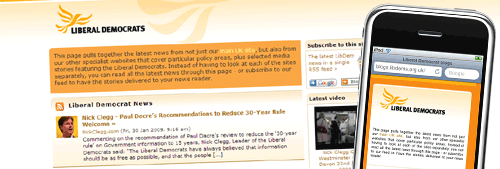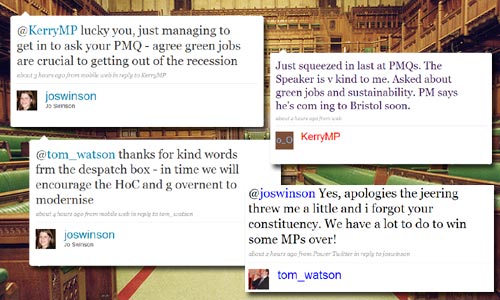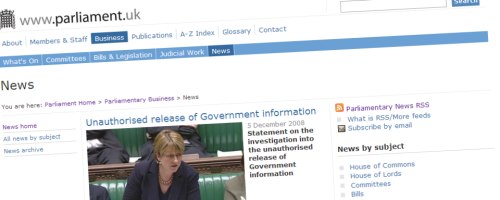A shock conclusion emerges from the Hansard Society’s latest research into MPs’ use of new-fangled technology: they are normal people. Well, ‘kind of normal-ish’, Labour’s Tom Harris clarifies. We’re here at Microsoft’s relatively new London offices to hear from three MPs, one from each of the main parties, on what they put in, and what they get out of blogging.
As things kick off, I’m feeling mildly subversive. Partly because I’m using a Linux laptop on Microsoft’s patch. But mainly because I’m the only person in a room of 50, here to talk about technological matters, with a laptop in front of them.
Tory MP Douglas Carswell is first up: he’s in a rush off. He makes, on the face of it, some provocative statements. Technology is ‘having a transformative effect on the disadvantaged’, he says, citing a specific example of local parents of special needs kids, who got information from similar support groups around the country, and used it to take him and the local authority to task. Westminster will need to adopt open source politics, he says, or new entrants will take market share; and it will ultimately lead, he suggests, to more grown-up politics. And with that, he makes the dash up Victoria Street to obey a three line whip. To be fair though, he did blog it up before I did.
Next it’s LibDem MP Lynne Featherstone: a blogger since 2003, but – she insists – she’s so not a geek. For her, it’s a way to prove she isn’t ‘lazy’ like ‘all the rest’; she extols the blog’s value in local campaigning. ‘I pay no mind to the dangers of blogging,’ she says – although, she admits, she does have someone check her stuff for anything ‘politically suicidal’.
Finally, at the top table anyway, it’s Tom Harris – who, he reminds us (to my own surprise), has been blogging less than a year. Straight away, he confronts the ‘received wisdom’ that he lost his ministerial job because of his blog: he genuinely doesn’t know if that’s true, and he hopes it isn’t a signal that ministers shouldn’t blog (or at least, shouldn’t be worth reading). He rejects suggestions that he’s some kind of maverick – in fact, he says, he takes ‘the party line’ very seriously, and assures us you won’t find much in his archives that deviates from it.
He started blogging as an outlet for the opinions which didn’t otherwise get a platform; and as a conscious effort to balance out the right-leaning dominance of the ‘blogscape’. As a former journalist, he finds the writing very easy: but interestingly, he reveals that he spends more time moderating comments than writing posts. (Andy Williamson tells us the majority of MPs’ ‘blogs’ don’t accept comments, incidentally. Hmm.)
Several times, particularly in the concluding Q&A, Tom speaks in favour of a liberal, almost anarchic position. It’s probably inevitable, he says, that every candidate at a forthcoming election will have a blog; it’ll be impossible for the parties to control centrally – ‘and that’s great’. He has a bit of a dig at ‘an unnamed individual’ displaying control-freak tendencies – but doesn’t name him. Whoever could he have meant?
I’m struck by Tom’s and Lynne’s differing routes into blogging. Lynne isn’t being too self-deprecating when she talks down her technical skills; but she’s astute enough to see the value in it all, and is surrounding herself with people whose skills complement hers. It makes her such an interesting appointment to head up the LibDems’ online efforts: she’s a campaigner at heart, and she’ll ensure that the party doesn’t get carried away with tech for tech’s sake.
Tom meanwhile comes across as ‘one of us’. Over a glass of wine afterwards, he expands a bit on the control freakery, naming a couple of names which I won’t repeat here. He isn’t too bothered how many of his blog’s readers are local constituents. Even if his blog cost him his ministerial job, I don’t hear any regret in his voice when he talks about it. He’s blogging for exactly the same reasons I do.
I leave feeling we’re in quite a happy position just now. Those MPs who are blogging (properly) are doing it because they want to, and/or because they want to get something constructive from it. We haven’t yet reached the point where all candidates need to be seen to do it – as, say, with tedious printed constituency newsletters. But there were signs tonight that it’s starting to happen… and that, fundamentally, is a bad thing.





